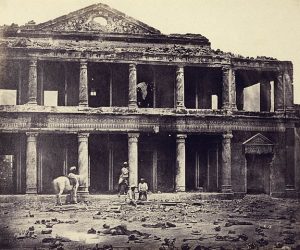Nicholas Spykman, the author of “America’s Strategy in World Politics” (1942) and “The Geography of the Peace” (1944), was a sociologist before he was a geopolitical theorist. In 1926, he wrote an article in the American Journal of Sociology on Asian nationalism that provides insights into current Asian-Western relations. In his article “The Social Background of Asiatic Nationalism,” Spykman focused on what he called “the revolt of Asia” then occurring in India and Java, but he also noted its presence in China and Russia.
Spykman described Asian-Western relations as a “conflict situation” that transcended the political clash between Western imperialism and Asian nationalism, and entered the realm of an Asian response to the economic and cultural penetration by Western powers. Western colonial powers, he explained, first penetrated Asia as economic mercantilists that minimally interfered with native cultures, but later transitioned to “capitalistic imperialism,” which demanded a “complete transformation of the native economy” and interfered more with local cultures.
“The original aim of both the British and the Dutch,” Spykman wrote, “was trade and commerce, not political power.” Both European powers established political relations with local leaders, but “political power was a means to an end, not an end in itself.” And though colonial political power expanded, it did not at first directly interfere with people’s lives. During this initial period of mercantilist colonialism, Spykman explained, “there was diffusion of culture and the assimilation of new traits, but no conscious transformation of native social life.”
That all changed, Spykman wrote, when colonial powers switched from mercantilist imperialism to capitalist imperialism, which involved a new system of production that engaged in “far-reaching interference with native life … and aggressive transformation of native culture.” It involved the introduction of an alien language in schools and economic life, which led to Western ideas penetrating the “native ideology.” Western economic ideas, goods, and tools meant “an entirely different economic system with new working conditions and a new social order.” The growth of capital investments in the Asian colonies, Spykman explained, “brought about the creation of a new economic order.” Spykman called it a “capitalistic invasion,” which created a “rapidly growing proletariat.” Western colonial powers attempted to swiftly transform mostly agrarian societies into industrial capitalist societies, and that caused “terrible dislocation of society and the formation of new classes.”
Capitalist penetration and industrial growth resulted in greater need for administrative government, including the “growth of a powerful bureaucracy.” The growing colonial bureaucracies increasingly interfered in the lives of the native people. Spykman argued that this foreign penetration of Asian culture led to the growth of Asian nationalism and also gave it “sociological expression.” In reaction to Western economic and cultural penetration, local group solidarity in these Asian countries expanded to a growing national solidarity. Asian peoples under cultural assault from foreign nations yearned to govern themselves. The cultural clash created a political conflict. For the Asian subjects of Western colonial rulers, politics was a way of defending their culture.
Asian nationalism, Spykman wrote, “started as a vague indefinite social phenomenon called unrest and … gradually developed into organized movements with definite programs.” Nationalist political parties formed. In India and Java, those nationalist movements were “more than mere political movements for self-government or dominion status.” Fundamentally, the nationalist movements wanted not just political independence but also cultural independence. They wanted to achieve political power to protect cultures that were under assault by the colonial West.
To be sure, Asian nationalists were happy to accept “Western science and Western techniques,” but they rejected Western values. Asian nationalists, Spykman wrote, wanted to combine “Western technique and Eastern values” to produce a “new culture which shall combine the best of both, posses a Western technique and yet retain the cultural values of their native civilization.”
Spykman’s profound insights about Asian nationalism and East-West cultural divisions can inform our understanding of Western relations with the nations of the Indo-Pacific. Since the death of Mao Zedong, for example, Western nations have assumed that the introduction of capitalist economics and Western culture would lead to political reform in China, but they underestimated China’s willingness to use political power to protect its culture and civilization.
Western powers, especially the United States, need to recognize that China, and even friendly powers such as Japan and India, will protect their culture with appeals to nationalism against Western penetration. Spykman saw this 95 years ago.
Francis P. Sempa is the author of the books “Geopolitics: From the Cold War to the 21st Century” and “America’s Global Role,” and has written frequently on history and foreign policy for the Asian Review of Books, the University Bookman, the Claremont Review of Books, The Diplomat, the South China Morning Post, Orbis, Joint Force Quarterly, Strategic Review, the New York Journal of Books, and other publications. He is a federal prosecutor and an adjunct professor of political science at Wilkes University.

































